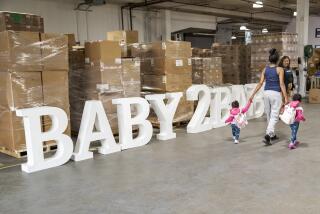ADVERTISING & MARKETING : Targeting Consumers From Day One : Hospitals’ tradition of sending new parents home with bags of stuff draws a cry of commercialism.
- Share via
WASHINGTON — Ann Leonard wasn’t surprised to find diaper samples and baby wipes in the gift pack she received as she left the hospital after childbirth. But credit card applications? Life insurance brochures? Chocolate bars?
In all, she got five bags filled with corporate promotions--some of which had nothing to do with babies. She lodged a complaint that prompted her hospital to end the practice.
Hospitals across the country regularly give away loads of free stuff, often to parents’ delight. But Leonard fears the gift packs prey on vulnerable new parents, who often interpret them as evidence their hospitals endorse the products.
“We’re thirsty for information and advice,” she said. “This was packaged as information and advice from a health-care professional we had come to trust.”
She took her complaint to her employer, who happens to be consumer advocate Ralph Nader. Now Nader is urging the American Hospital Assn. to tell hospitals across the country that it opposes “such crass commercialism at such a sensitive time” for patients.
Hospitals have long weathered criticism for giving away baby formula. That, critics contend, discourages moms from breast-feeding, which medical experts consider to be healthier.
But Nader’s is the first organized protest over other commercial products that have crept into the traditional gift bags for new mothers. The products are packaged by national companies that give them away to hospitals, which in turn give them away to patients.
Hospitals say that, aside from the formula problem, the only complaints they get about freebies are when a competing hospital gives away more than they do.
“They love getting this,” said Catherine Dahlem, head nurse manager for University Hospitals of Cleveland. “It’s sort of like the Welcome Wagon.”
Many new mothers agree. Brynda Fowler of Austin, Texas, said she saved $4 or $5 in diaper coupons and enjoyed the free baby wipes and free diaper bag in her gift pack.
As for the credit card and life insurance offers, “I just threw it in the trash,” she said.
But George Washington University Hospital, the target of Leonard’s complaint, agreed the commercial items were “inappropriate” and promised to replace them with neutral gifts.
“After our review of the bags’ content we found your complaints to be valid,” Phillip S. Schaengold, the hospital’s chief executive officer, wrote Nader’s group after it lodged the complaint on behalf of Leonard.
This is the first time the issue has been brought to the American Hospital Assn.’s attention. Spokesman Rick Wade said the group would research the issue and, if appropriate, suggest that its members examine their policies.
“You can overdo anything,” Wade said, saying certain products might be “over the line.”
At University Hospital in Cleveland, Dahlem gets calls almost every week looking for her staff to hand out one product or another. She doesn’t have time to sort through all the offers, so she just uses the packages put together by national companies.
The mix can include just about any product that might interest a new parent, such as a new credit card to facilitate purchases for a child.
Companies promoting their products pay the distribution and marketing firms to be included in the packs, which are given to hospitals without charge.
“For the most part, the hospitals love getting them,” said Kristi Goyette of American Baby Group, which distributes about 3.5 million packages each year to 4,000 hospitals.
Nader is pressing his case by collecting the names of mothers who range from annoyed to outraged.
“Here you are a new family, and you have all your anxieties, and you’re bombarded by promotional materials,” said Hailyn Chen, 26, of South Pasadena, who gave birth last year to daughter Katherine. “You almost think, to be a good parent, maybe I do need to get all this stuff.”
More to Read
Inside the business of entertainment
The Wide Shot brings you news, analysis and insights on everything from streaming wars to production — and what it all means for the future.
You may occasionally receive promotional content from the Los Angeles Times.










